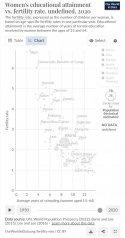Most people who don't want any kids don't have them because having kids lowers the quality of their life. Kids just take all of their free time for like 5+ years and are an emotional burden and stress for another 10 or more. Those are a huge part of the population. Tens of percent of the new generations, easily.
Some people who have one kid also think like that now that they had experience with one kid and they don't want another.
But there is a small subset of people who have one kid and who would perhaps have another if they had housing for a bigger family, money for education and so on.
Yeah this. It's really hard to bribe people into having kids, because the economics of not having (more than 1 or 2) kids is so powerful, no government can afford to bribe people out of this mess.
As an example, let's take a look at what I think is close to a best-case TFR for a modern industrialized society:
Start with 100 couples
20% of them won't get married. The women might have waited too long, the men might be too financially incapable or too short/unattractive, etc. The latter is not necessarily a bad thing--you don't necessarily want the bottom of the gene pool to reproduce. I don't think any government can realistically decrease this number, especially not without affecting the quality of the population.
80 couples left
10% of the couples won't have kids. Mostly due to health reasons/waited too long before trying. A minority probably bought into the DINK propaganda. Again, I don't think any government can realistically decrease this number, since it's honestly pretty low.
72 couples left
30% of the couples who have kids stop after having 1 kid. Either 1 is too much to handle, or health reasons. This is where government assistance might make a small difference.
50% of the couples who have kids stop after having 2 kids. This is the realistic maximum for most couples because it becomes exponentially more difficult to raise children when you don't have at least 1 parent per child.
10% of the couples who have kids have 3 kids.
10% of the couples who have kids have 4 kids. This is probably a bit high. It's probably more like 5% of families have 4 or more.
Total TFR for the above example would be (0.3*72+0.5*2*72+0.1*3*72+0.1*4*72)/100 = 1.44. Well below replacement, yet it's hard to see how this can be increased to replacement.
Even something really drastic, like somehow getting half of 1-child families to have a second kid, and half of 2-child families to have a 3rd kid, still isn't enough for replacement: (0.15*72+0.4*2*72+0.35*3*72+0.1*4*72)/100 = 1.73
Like you'll have to coerce 90% of the population into getting married, get all married couples to have kids, and have everyone have at least 2 kids and a significant portion to have 3 kids to get to 2.1:
Like this gets to 2.1:
100 couples
only 10% don't get married
95% of married couples have kids (86 couples with kids)
10% of the married couples with kids have 1 kid
50% of the married couples with kids have 2 kids
25% of the married couples with kids have 3 kids
15% of the married couples with kids have 4 kids
(0.1*86+0.5*2*86+0.25*3*86+0.15*4*86)/100=2.11
I don't see how in hell that is possible with any amount of government support that can be realistically provided
Perhaps the best solution would be to increase lifespans dramatically instead of trying to get people to have more children when modern parents are heavily disincentivized from having more than 2

